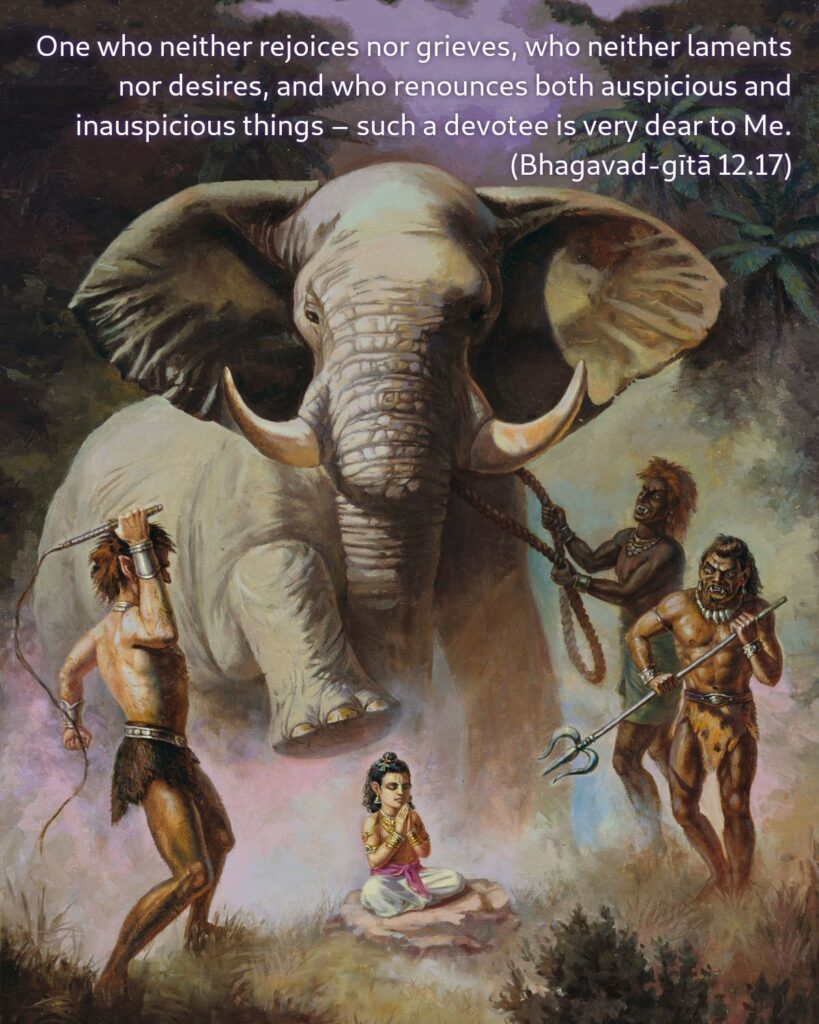यो न हृष्यति न द्वेष्टि न शोचति न काङ् क्षति |
शुभाशुभपरित्यागी भक्तिमान्य: स मे प्रिय: || 17||
yo na hṛiṣhyati na dveṣhṭi na śhochati na kāṅkṣhati
śhubhāśhubha-parityāgī bhaktimān yaḥ sa me priyaḥ
yaḥ—who; na—neither; hṛiṣhyati—rejoice; na—nor; dveṣhṭi—despair; na—neither; śhochati—lament; na—nor; kāṅkṣhati—hanker for gain; śhubha-aśhubha-parityāgī—who renounce both good and evil deeds; bhakti-mān—full of devotion; yaḥ—who; saḥ—that person; me—to Me; priyaḥ—very dear
Translation:
Who is not elated, who does not hate, does not grieve, who has renounced both good and bad, he, My devotee is dear to Me.
Commentary:
na hrishyati: The devotee is always calm and is not elated with pleasure or joy. Of course, joy is a good quality, but here it refers to the unbalanced fits of elations that overtake the common man when good things come to him. Joy and sorrow are pairs of opposites (dvandas) which stand in the way of realisation. Unless the mind is freed from these pairs, firmness in self-realisation is impossible.
subbhasubhaparityagi: This may give rise to doubt for the reader. The way of the world is to give up ‘asubha’ and hold on to ‘subha’. Here it is stated that both should be renounced. We must understand these statements continuously by studying the context of each of these thoughts. Here the ultimate goal of ‘Bhakti’ is being declared. The final end of Bhakti and Jnana are the same. The perfect devotee and the perfect ‘Jnani’, both have their life and being in the Divine, the Atma. This state is that of the ‘Jivanmukta’ who has transcended all the modifications of the mind. In that state the pairs of opposites like heat and cold, pleasure and pain, joy and sorrow, good and bad, do not exist. Only the Divine, the Atma exits. So the perfect devotee is free from both good and bad. The seekers should take to ‘subha’ first and eliminate ‘asubha’, and then both should be given up. This is the thought-free (‘nirvikalpa’) state. ‘Subha’ and ‘asubha’ drop away in the ultimate stage when only the Divine appears everywhere for the perfected devotee. This is the idea of subhasubhaparityagi, and not giving up good and auspicious actions.
Bhagavad Gita: Chapter 12 🔻 (20 Verses)
